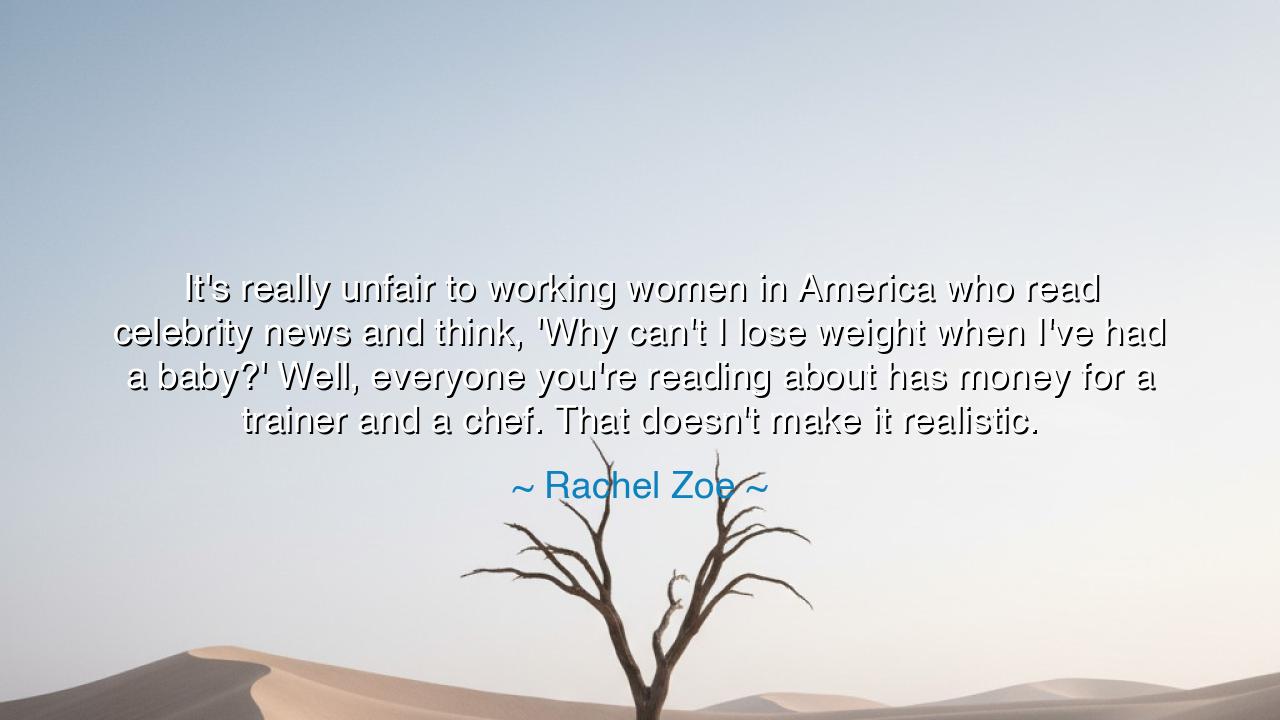
It's really unfair to working women in America who read celebrity
It's really unfair to working women in America who read celebrity news and think, 'Why can't I lose weight when I've had a baby?' Well, everyone you're reading about has money for a trainer and a chef. That doesn't make it realistic.






In the vast landscape of life, where every path is filled with challenges, the battle for self-acceptance and balance often seems overwhelming. Rachel Zoe’s words ring with the sting of truth: "It's really unfair to working women in America who read celebrity news and think, 'Why can't I lose weight when I've had a baby?' Well, everyone you're reading about has money for a trainer and a chef. That doesn't make it realistic." These words speak to the profound disconnect between the idealized images we see in the media and the realities of our daily lives. For the ancient sages, this idea of comparing oneself to unattainable standards would have been seen as a great source of suffering—a suffering that steals from us the peace and joy we could otherwise experience in the natural course of our lives.
The ancient Greeks, particularly the philosophers, understood the danger of envy and the pursuit of unrealistic ideals. Socrates spoke often of the need to cultivate inner virtue rather than seeking to emulate the superficial virtues of others. In his mind, true wisdom and happiness were born from self-awareness and a life led by reason, not by the fleeting, often deceptive, images of beauty or success we see around us. Just as Zoe points out the impossibility of achieving the same results as a celebrity when we lack their resources, the ancient Greeks would urge us to seek our own path of fulfillment—one that does not rely on external comparisons but is grounded in personal growth and self-acceptance.
The Romans, too, recognized that the pursuit of perfection could lead to great inner turmoil. The philosopher Seneca, in his reflections on life, wrote extensively about the importance of contentment and how it is undermined by the desire to keep up with others. Seneca advised that true freedom and peace of mind come not from external achievements but from accepting our own limitations and focusing on our personal virtues. The great Roman general Cincinnatus serves as an example. Known for his wisdom and simplicity, he was a man who valued duty and modesty over personal glory. His life stood in sharp contrast to the extravagant displays of wealth and luxury in Rome, reminding us that fulfillment does not come from external standards but from inner strength and purpose.
When Zoe speaks of the disparity between the average working woman and the celebrity lifestyle, she is addressing a truth that the ancients knew well—that comparing oneself to others, particularly to those living in vastly different circumstances, breeds frustration and discontent. The legendary warrior women of history, like Boudicca of the Celts, did not have time to compare themselves to the empresses or queens of distant lands. Instead, they focused on what was within their reach—strengthening their people and leading with purpose. It was their inner strength, rather than the opulence around them, that defined their greatness. In this same way, Zoe’s call reminds us that the pursuit of well-being should not be rooted in unrealistic comparisons to others but in recognizing our own unique circumstances and resources.
Consider, too, the Buddhist principle of non-attachment, which teaches that the source of our suffering lies in our desire for things that are fleeting and often unattainable. The Buddhas believed that true peace arises when we release our attachment to external circumstances—be they wealth, beauty, or the expectations of others—and focus instead on the peace within. Zoe’s observation about the unrealistic pressures placed on women—whether to lose weight or maintain a certain appearance—echoes this principle. We must learn to live in acceptance of who we are, recognizing that external standards are often out of our control and that true happiness lies in our ability to live in harmony with ourselves, free from the pull of external judgment.
The lesson to be learned from Zoe’s words is one of self-compassion and realism. In our modern world, where images of perfection are constantly pushed in our faces, it is easy to forget that what we see is often an illusion—an image shaped by money, privilege, and resources that most of us do not have. Just as the ancients taught that peace comes from within, Zoe’s message reminds us that the pursuit of health, beauty, or success should be grounded in our own realities, not the unattainable goals of others. To look at ourselves with compassion and set goals that align with our own lives and resources is the only path to true well-being.
As you walk your own path, remember the wisdom of the ancients and the call of Zoe: focus not on the images you see in the media, but on the path that is uniquely yours. Cultivate self-awareness, acceptance, and compassion for yourself. Set goals that are realistic, grounded in your own circumstances, and reflect the true strength of your character. Strive to be the best version of yourself, not a reflection of someone else’s ideals. In doing so, you will find the peace and fulfillment that the ancients sought—not in comparison, but in embracing your own journey with grace and strength.






AAdministratorAdministrator
Welcome, honored guests. Please leave a comment, we will respond soon